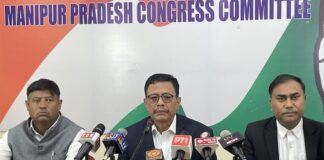New Delhi: Prime Minister Narendra Modi on Saturday said that India is willing to contribute towards any peace effort to end the Russia-Ukraine conflict, during talks with visiting German Chancellor Olaf Scholz here.
In his remarks after their bilateral talks held in Hyderabad House, the PM said: “The effects of the Covid pandemic and the Ukraine conflict have impacted the entire world; it has especially had a negative impact on developing countries.
“We discussed our shared concerns on these aspects; we are in agreement that the resolution of these issues can be only through joint efforts.
“Under India’s G20 presidency we are stressing on this aspect.
“From the beginning of the Ukraine conflict, India has been stressing on dialogue and diplomacy to end this conflict.
“India is ready to contribute towards any peace efforts to end the conflict,” the PM said.
The German Chancellor in his remarks said that the world is suffering due to the Russian “aggression” in Ukraine.
While expressing full confidence in India’s G20 presidency, the German Chancellor said that they have to make sure that countries in Asia and Africa are not negatively hit by supply shortages due to the Ukraine conflict.
“The war began a year ago and has led to immense losses in energy, and is a major catastrophe… It is important that in the UN too we state where we stand on this matter…The world is suffering due to Russia’s aggression,” Chancellor Scholz said.
Foreign Secretary Vinay Mohan Kwatra, in a special briefing on the visit, said the Russia-Ukraine conflict had “featured fairly extensively in the discussions” between the two leaders. He added that “there was deep understanding and appreciation of what was going on, how it impacts on the developing world and how India and Germany can partner to strengthen the voice of peace”.
The Foreign Secretary reiterated what PM Modi had stated during the SCO summit in Samarkand last September “that this is not the era of war”.
“There was understanding and appreciation of each other’s perspectives,” the FS stated, to a question on whether the two leaders stood on opposite sides regarding the Ukraine conflict.
Prime Minister Modi’s remarks during the media statements post his meeting with the German Chancellor comes as the Russia-Ukraine conflict has completed a year and shows no signs of ending, with the West focused on slamming Moscow and helping Kyiv with more weapons.
On Thursday, in the UN General Assembly, India was among 32 countries that abstained on voting on a resolution calling for Russia to leave Ukraine.
In other remarks after the talks, the PM said the two sides also reiterated the consensus that reform of multi-lateral institutions is necessary to better reflect global realities. “This is evident from our active participation within the G4 to reform the UN Security Council,” the PM said. India, Germany, Brazil, and Japan comprise the G4 countries which support each other’s bids for permanent seats in the UN.
The PM said the two sides have agreed to increase cooperation under the Triangular Development Cooperation, under which both countries last year agreed to work in third countries. FS Kwatra said that the Trilateral Development Cooperation was in “advanced stages of implementation” in Cameroon, Ghana, Malawi and Peru.
The PM also said that in the last few years the people-to-people ties between the two sides have increased, and the Migration and Mobility Agreement inked will make it stronger.
Referring to the Migration and Mobility Agreement, inked between the two sides in December last year, the German Chancellor had said his country needs “talented and skilled workers”. FS Kwatra said while the agreement still has to be ratified by the German side, it is proof of how skilled manpower contributes to the economic growth of both sides.
PM Modi said that security and defence cooperation can be a major foundation pillar of their bilateral ties, and they would continue to work together to tap the untapped potential in this sector.
On defence cooperation, the FS said that the two sides have “multi-layered cooperation in defence, mostly on what industries and businesses on both sides can do”.
“Part of it was what can be co-designed here, and where it can take place, how the businesses of the two sides can come together to harness the opportunity, and using the complementarities for co-manufacturing, co-design and also transfer of technology.”
On the issue of talks with the German side on the purchase of six new submarines — a deal believed to be worth $5.2 billion, the Foreign Secretary said the issue of the submarines “remains a topic of discussion between both governments”, which would also involve co-design, co-development and manufacture in India, and transfer of technology would be an important constituent as the talks progress.
The PM also said there is “active cooperation between India and Germany in the fight against terrorism and separatism. Both countries also agree that concrete action is necessary to end cross-border terrorism.”

